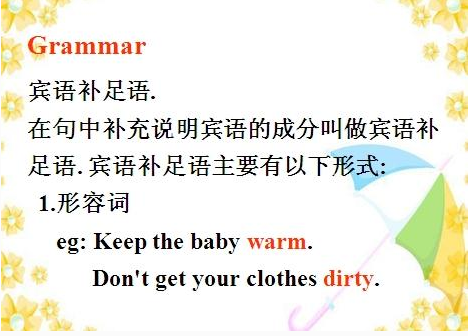①we keep the classroom clean。
我們保持教室幹淨。
主語 we,謂語動詞 keep,賓語 classroom,賓補 clean。
②I give him a thousand dollars。
我給了他一千塊錢。
主語I,謂語動詞give,賓語 thousand,賓補dollars。
③I kept the room warm。
我保持房間溫暖。
主語I,謂語動詞kept,賓語room,賓補warm。
擴展資料:
I'm going to paint the desk pink.
我打算把桌子塗成粉紅色。
句子中的the desk是賓語。一般來說,一個句子由“主謂賓”結構組成——也即是說,上麵這個句子如果是
I'm going to paint the desk. 也是完全正確的。
(我 主語) (塗色 謂語) (桌子 賓語)
主謂賓結構最簡單的例子,就是“我愛你”。一個句子隻要像“我愛你”這句話一樣有主謂賓就是正確的。
那為什麼the desk後麵還要加一個pink呢?因為我想補充說明我想把桌子塗成什麼樣的。我將要做的不隻是要塗桌子,而是把桌子塗成粉紅色。“pink” 是句子中的賓語補足語,pink闡述了the desk的狀態,讓句子意思更加完整。
“pink”是形容詞做賓語補足語。能夠充當賓補的還有:不定式,現在分詞,過去分詞,副詞,介賓短語。一般情況下,賓補通常緊跟在賓語之後。
含主謂賓賓補結構的英語句子
1.I (主)call (謂)him(賓) Tom(賓補) 我叫他湯姆。
2.She(主) ordered(謂) herself(賓) a new dress(賓補) 她給自己訂購了一套裙子。
3.She(主) cooked(謂) her hushand(賓) a delicious meal(賓補) 她給她丈夫做了一頓美味的飯。
4.He(主) brought(謂) you(賓) a dictionnary(賓補) 他給你買了一本字典。
5.I(主) showed(謂) him(賓) my pictures(賓補) 我給他看我的照片。
...

翻譯句子賓補
我們推選他當我們的領導(名詞做賓補)We recommend him our leader當你說話時你應該讓別人聽懂(過去分詞作賓補)When you say something you should make the others understood請別拘束(介詞短語作賓補)Please make yourself at home
一個句子怎麼看是賓補和副詞
首先I tell you happy 這句話是你自己編的吧?這句話本身就是病句。
正確的是:I tell you happily 。
其次,你的問題其實也有問題。
副詞和賓補不是並列關係,副詞本身就可以做賓補。
猜你想我問的是賓補和狀語的區別。
區分起來很容易。
狀語是修飾謂語的,換句話說,是描述主語發出的動作的,所以你看這個詞是跟描述的主語的動作,那麼就是狀語;如果是修飾賓語的,那麼就是賓補。
比如:I make you happy.這裏的happy是I happy還是 you happy?很明顯,是you happy, you 又是賓語,所以happy是賓補。
再如:I take it happily.這裏的happily是 I happily 還是 it happily?明顯是I happily,所以happily這裏是狀語。
【請用with+賓語+賓補的句式造一個句子?並注明此句的意思.】作業幫
不論何種時態,語態,語氣,凡由一個動詞(或動詞詞組)構成的謂語都是簡單謂語。
賓語是動作、行為的對象,是動作的承受者。
賓語由名詞、代詞、不定式或相當於名詞的詞、短語來擔任。
當然,也可以由一個句子來充當,稱之為賓語從句,所以一個句子中不一定隻有一個賓語.區別是賓於一般是名詞,謂語一般是動詞。
賓補可以是句子嗎?
主語+賓語+補語S V O C (主+謂+賓+賓補)1. 他們任命他當經理。
2. 他們把門漆成綠色。
3. 這使得他們要細想一想。
4. 他們發現那房子無人居住。
5. 他怎麼會這樣想? 6. 我們送他出去。
7. 他要我早點回來。
8. 我看見他們上了那輛公共汽車。
1. They │appointed │him │manager. ┃ ┃2. They │painted │the door │green. ┃ ┃3. This │set │them │thinking. ┃ ┃4. They │found │the house │deserted. ┃ ┃5. What │makes │him │think so? ┃ ┃6. We │saw │him │out. ┃ ┃7. He │asked │me │to come back soon. ┃ ┃8. I │saw │them │getting on the bus. ┃ 最常用結構 (1)make +n.+adj./v+ed/n./動詞原形 (2)make +it +賓補+to do something (3)find +n+adj./v+ing /v+ed (4) find it + 賓補+to do something 注意:make的賓補不能是v+ing; find的賓補不能是不定式 ----------------------------------其他例句:【The other students in the class keep their eyes closed.】The other students in the class keep their eyes closed.班上的其它的學生閉著眼睛。
Keep their eyes closed 閉著他們的眼睛。
這是一個短語,其構成形式是“keep +賓語+賓補”。
賓語可以是名詞或代詞,賓補可以是形容詞,介詞短語或者分詞。
Keep 表示“保持”,本句型意思是“保持(使)…為…狀態”。
例如:Please keep our classroom clean and bright.請保持我們的教室幹淨明亮。
Everybody must keep your clothes clean.大家必須保持衣服幹淨。
【It's hot,keep the windows open.】It's hot,keep the windows open.天氣熱,讓窗戶開著吧。
Keep it in the box.就把它放在箱子裏吧。
The teacher keeps the students sitting in the classroom.老師讓學生坐在教室裏。
動詞作賓補的簡單例句,要求說明詳細!
帶to的不定式作賓補a.可以用帶to的不定式作賓補的動詞常用的有ask,tell,order,invite,beg, get,allow,wish,want,encourage,advise, warn等。
例如:The teacher asked us to finish our homework.老師叫我們完成家庭作業。
She wanted him to sing for her friends.她想讓他為她的朋友唱歌。
The policeman told the boys not to play in the street.警察告訴孩子們別在街上玩耍。
b.在動詞think,believe,know,find, understand,take等之後,作賓補的不定式多由“to be +adj.”構成。
例如:They find the Chinese people to be happy and cheerful.他們發現中國人都很幸福快樂。
He believed the earth to be a globe.他相信大地是個球體。
c.在某些短語後也可跟帶to的不定式作賓補。
這類動詞短語常見的有:wait for,call on,depend on,care for,long for等。
例如:The crocodile waited for the monkey to come down again.鱷魚等著猴子再下來。
The chairman called on Mr Brown to speak.主席請布朗先生講話。
I shouldn't care for that man to be my doctor.我不要那人給我看病。
不定式是非謂語動詞的其中一種,原型是to do ,根據各種時態變化形式三、不定式作賓補應注意的事項 能跟不定式作賓補的動詞很多,如:see, have, advise, expect, get,invite, consider, find, prefer, feel, ask, for, call on, wait for…等等。
大部分的動詞或成語動詞之後跟帶to的不定式作賓補,但也有一些動詞之後要求跟不帶to的不定式作賓補。
下麵談一些要求跟不帶to的不定式作賓補的動詞。
1.這類動詞有表示視覺、聽覺和感覺的動詞,如,see, watch, notice, observe, look at, hear, listen to, feel等。
(1) Did you see him steal the money? (2) I haven't noticed anyone go out. (3) I'd like to look at (=watch) other people play basketball. (4) I often hear her sing this song. (5) She listened to someone call for help. (6) Mary felt something crawl up her neck. 2.一些表示役使意義的動詞,如have, make, let等。
(1) I would have Li Ming do the work. (2) Her wonderful performance made all of us laugh. (3) I'll let someone find me a house to live in. 3.有時動詞help的賓補既可以是帶to的不定式亦可省略to,如, I enjoy helping my mother (to) do housework. 4.上麵所說的這些不帶to的不定式做賓補,如改為被動語態就要用帶to的不定式作主語補足語(略)。
5.一些表示心理狀態語的動詞,如: consider, think, believe, discover, judge, sup pose 等,其後的賓語補足語有“認為”、“判定”的意思,認為賓語是什麼,有什麼性質、特征或處於某種狀態,這時賓補要用“to be …” 這種形式,“to be”亦可省略。
如: (1) He considered him (to be) innocent. (2) We all thought John (to be) quite a foolish man. (3) The judge judged her (to be) guilty. 6.regard, treat, recognize, look upon, think of, consider 等這些詞有時跟as詞組或介詞詞組作賓補,如: (1) All the teachers regarded this as of great importance. (2) I always look upon you as my best friend. (3) Don't take my good intentions for evil ones. 有時有多種形式,以consider為例: I consider him to be an honest man. I consider him as an honest man. I consider him an honest man. 四、賓語補足語和先行賓語 1.在複合賓語中,如果賓語不是名詞或帶詞,而是其它的形式,如不定式(a),-ing分詞結構(b)或that分句,這時就要用先行賓語it來表示,而後將這些賓語移置賓補之後,如: (1) it代替不定式或不定式的複合結構 We think it our duty to serve people heart and soul. Do you believe it possible for us to land on the Mars one day? I don't consider it polite of you to play tricks on others. 例句附解析,講解得已經很詳細了,如還不太清楚以上句子中的賓補在哪,就追問吧。
多舉一些"主語+賓補動詞+賓語+賓補”的句子,越多越好
賓補就是賓語補足語在英語中有些及物動詞,接了賓語意義仍不完整,還需要有1個其他的句子成分,來補充說明賓語的意義、狀態等,稱為賓語補足語,簡稱賓補。
某些及物動詞的賓語後麵還需要有一個補足語,意思才完整,賓語和它的補足語構成複合賓語。
而複合賓語的第一部分通常由名詞或代詞充當,第二部分表示第一部分的名詞或代詞發出的動作或身份、特征等,稱為賓語補足語。
拓展資料:比如說: I heard Jean singing this morning. 句子中的Jean顯然是賓語。
但是主語I聽到的並不是Jean,而是Jean singing。
singing 是句子中的賓語補足語。
它和賓語之間是邏輯上的主謂關係,也就是說從邏輯上來講,是Jean執行了singing的動作。
句子中的singing是現在分詞做賓語補足語。
能夠充當賓補的還有賓語補足語的大致有:不定式,現在分詞,過去分詞,形容詞,副詞,介賓短語等。
一般情況下,賓補通常緊跟在賓語之後。




 冬冬11829293
冬冬11829293


